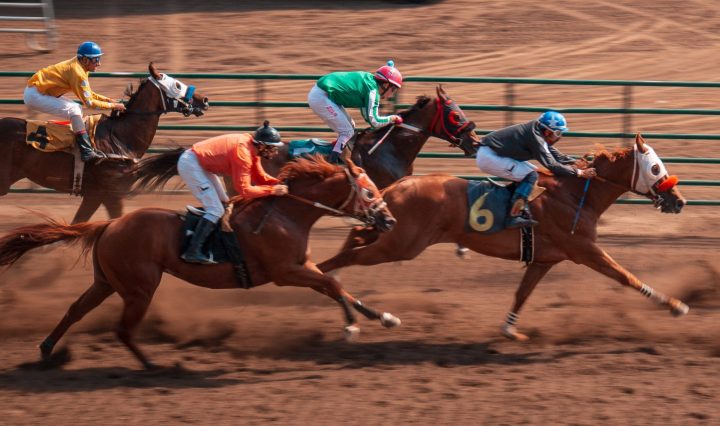THE CONVERSATION
Do racehorses even know they’re ‘racing’ each other? It’s unlikely

Horses naturally synchronise their running in groups – but ‘racing’ and ‘winning’ are human concepts.
When the racing season arrives, everyone becomes an expert on the horses that are the stars of the spectacle. TV personalities, professional pundits and form guides talk confidently about the favourite’s “will to win”. In close races, the equine contestants “battle it out”, demonstrating “heart”, “grit” and “determination”.
But do horses even know they are in a race, let alone have a desire to win it? Do they understand what it means when their nose is the first one to pass the post? Based on decades of experience and everything we know about horse behaviour, I think the most plausible answer is “no”.
From the horse’s perspective
From a horse’s perspective, there are few intrinsic rewards for winning a race.
Reaching the end might mean relief from the pressure to keep galloping at high speed and hits from the jockey’s whip, but the same is true for all the horses once they pass the finishing post. If the race is close, the horse that eventually wins might even be whipped more often in the final stages than horses further back in the field.
So while being first to reach the winning post can be crucially important to the horse’s human connections, there is very little direct, intrinsic benefit to the horse that would motivate it to voluntarily gallop faster to achieve this outcome.
So does a horse even know it’s in a race? Again, the answer is likely “no”.
Running (cantering or galloping) is a quintessential horse behaviour and horses voluntarily run together in groups when given the opportunity – even in races without jockeys. However, there are several reasons to think horses have not evolved a desire to “win” during a group gallop.
Horses are social animals. In the wild, to minimise their exposure to predators, they synchronise their movement with other horses in their group. This synchronisation includes maintaining similar speeds to other group members (to keep the group together), being alert to the positions of their own body and their neighbours to avoid collisions, and adapting their speed to the terrain and environmental cues that indicate upcoming danger or obstacles. In the wild, “winning” – that is, arriving first, long before other group members – could even be negative, exposing the “winner” to an increased risk of predation.
This collective behaviour is the opposite of what owners, trainers and punters want from horses during a race.
The horse’s preferences (and how riders override them)
Horse races depend on two horse-related factors: the horse’s innate tendency to synchronise with other horses, and its ability to be trained to ignore these tendencies in response to cues from the jockey during a race.
Trainers and jockeys also harness the preferences of individual horses. Some horses are averse to bunching up with others during the race, so jockeys let them move to the front of the field (these are “front runners”). Other horses seek the security of the group, so jockeys let them remain in the bunch until closer to the winning post (these are “come-from-behind” winners).
Jockeys use several different interventions to override the horse’s innate tendency to synchronise. These might include:
- directing the horses to travel much closer to the other horses (risking the sometimes fatal injuries we sometimes see at the track)
- travelling at speeds, not of the horse’s choosing (usually at far higher speeds and for longer durations, and often maintained by use of the whip)
- preventing the horse from changing course to adapt its position relative to other horses in the field (directing its path via pressure on the mouth from the bit or taps from the whip).
During the early stages of a race, jockeys rely on horses’ innate desire to remain with the group to ensure they maintain the physical effort required to keep in touch with the front runners. This tendency may then be overruled so the horse will act independently of the group, leave it behind and come to the front to hopefully win.
No concept of being in a race
So horses most likely have no concept of being in a “race”, where the goal of their galloping is to get to a certain location on the track before any of the other horses. However, they undoubtedly know what it’s like to be in a race. That is, they learn through prior experience and training what is likely to happen and what to do during a race.
With jockeys and trainers who understand the individual preferences of their horses to maximise their chances during the race, there will always be one horse that reaches that part of the track designated the winning post before the other horses in the group. But as for winning horses understanding they are there to “win”? It’s far more likely it is the combination of natural ability, physical fitness and jockey skill that accounts for which horse wins, rather than any innate desire by that horse to get to the winning post before the other horses. DM
This story was first published on The Conversation. Cathrynne Henshall is a Lecturer at the School of Agricultural, Environmental and Veterinary Sciences at Charles Sturt University.



















 Become an Insider
Become an Insider
The only reason horse racing is not treated as animal cruelty is the big money involved.
We train race horses and we can see from their reaction that there are horses that know when they win and when they have run a bad race so I cannot agree that all horses do not know
Sad, very sad that someone bereft of horse knowledge can write an article like this. In the same way as I would not write an article on brain surgery, this is a travesty. My reply to contradict such an ignorant article would require a full article. I learnt to ride aged 5 and acquired a retired smart 5 time winner of the minimum 1000 sprint. He was fast. Knew it. And loved it. His instinct was to run as fast as he could. But he loved it. Anybody around a horse will very quickly read their moods and pleasures. When they’re happy, they show it. When they win the posture rises and the stride becomes a strut. They do show off. Anyone who has taken a horse cantering to the start will relate how the neck swells as it arches with the head down. They perk and relish the energy at the start. These are intelligent animals, and often more so than their human counterparts. A horse that doesn’t want to race will let you know. If not in behaviour, then reluctance to load. We all know that this is a sign that something is amiss. We’ll return home and look for the ailment and preserve the animal. We are extremely particular about their post racing homes. I have spectacular footage of those that left me and what they have done subsequently. A very poor, slow horse I saved from a considered merciful escape from pulling a cart, clears across a pick up truck. If it didn’t enjoy it then the rider would find itself in the back of the truck as Kepler digs his toes in. Just like races, some do, some don’t. Those that don’t very quickly show it and we move them out.
The writer would do well to actually sit on the back of a thoroughbred and aim down the track. They will very quickly realise what the horse actually wants.
I always laugh at the Schumacher wannabes on the road and wonder how brave they will feel after just 300m seeing an approaching vibracrete wall at the end of the track?
Nobody permits an experienced rider on a thoroughbred because it will take charge and do what it likes to do best. Run at speed. I’m a competitive runner, so I do too. Never mind the cardiovascular or the breathing difficulty. I go as hard as I can.
Clearly, this writer hasn’t enjoyed the immense privilege of a stud farm. Common behaviour is they race around the paddock just before feeding time and then line up at the gate to come in. In the Karoo I saw a vast expanse where the horses graze on the far side of a lake. When they see the bakkie, laden with customary feed, across the far side approaching on the road they take off for the gate over a kilometre away. And guess? They run flat out to get there and the food first. They are not as social as this writer’s misapprehension that they willingly dine together.
As an amateur I have had the greatest exhilaration of riding many winners and in a substantial number of races. I’ve ridden poor, moderate, good and multiple champions. With an increasing aptitude and attitude commensurate with ability. I’ve been beaten with 400 to go and just pushed with the hands in the hope of sustaining for as long as possible. I’ve had the emotional experience of choking up as I marvelled from where did this courageous honesty come as they carried me to victory.
Since my first winner in 1984 I regale the tale of the GP who told us in 1973 that sex will be the greatest feeling of our lives.
I feel sorry for the poor guy, I really do.
He’d never ridden a half decent racehorse!
I have done about 8,000 km competitive endurance riding, so if one takes the training rides into account, usually done with a group of other horses it probably makes up about 16,000 or more km of riding in groups of horses. I have also had a small herd of horses running in almost wild circumstances. You have alpha type horses that always prefer to be in the front and other horses that are just happy to follow. Of the horses I have ridden in particular one was, during the herd’s natural movements, quite happy to be just a follower. When ridden in a group however she always wanted to be in front. If we were alone on the course and another horse was in sight far ahead she would insist on not only catching up with the other horse but also passing that other horse and leading it or leaving it behind. I never ever used a whip on her – in fact I had to hold her back to pace her or she would exhaust herself to get ahead. Another was very much an alpha and leader of the herd. Although she did not have the physical attributes to be a winner she would insist on being at the front of any group. If in front she was happy. If I kept her back behind the other horses she would sulk and at the first sign of a gap would charge for it to get ahead. It is clear that some horses are very competitive by nature and will strive to lead the pack – in other words to win. Some may not be competitive and have to be coerced to win if they are physically superior – but a truly competitive horse will have the urge to be ahead of the others. In human terms this means they want to be winners, and are gratified to win. A leader that does not win may also show in their body language that they are not happy to have not made it ahead of the others. Many are just herd horses and it won’t make any difference whether they win or lose. I think you can apply this to humans as well. Most important is that horse natural “winners” are not in it for the money. They enjoy winning – if their owners, jockeys and trainers don’t spoil it for them.